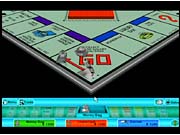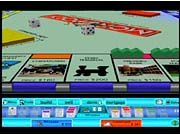Many adults probably remember playing Parker Brothers' classic board game Monopoly in their younger days. It seems obvious for a company to produce a computerized version, and as it turns out, there have already been many versions of Monopoly released for the PC, some with variations on the game's traditional rules. Infogrames' new version of Monopoly has just the right combination of 3D graphics, animations, and sounds to make the classic board game fun and involving on the PC.

You can play Monopoly against human and computer opponents on a single computer, or you can host or join a multiplayer game using a third-party application. The game also lets you choose different boards to play on. You can play on the classic board or on one of 10 variations, each of which is based on a different US city with each property renamed after a local landmark. For example, Boardwalk becomes Sea Cliff on the San Francisco board. You'll also have to choose from either a standard or custom rule set. You'll find plenty of options in the custom rules, so most Monopoly fans should be able to come up with a custom setting they like best. For example, you can turn on "free parking," hand out more starting money, or enable rent immunity.
Perhaps the cleverest aspect of the new game is its fully 3D animations. Each piece has a different animation when it moves across the board. The horseman will hop onto the next space, while the steamship will speed forward with its smokestacks spewing out smoke. The dice roll onto the board in a lifelike manner--they won't just drop onto the board in the same spot each time. And whenever you draw a community chest or chance card, you'll see the famous Mr. Monopoly character perform various animations based on the card. All the animations are entertaining and well done--they don't seem obvious or forced. However, if you don't wish to be slowed down by the animations, you can simply turn them off. In fact, you can toggle off just about all the bells and whistles, including the game's music and narration, if you'd like your game of Monopoly to look and feel just like the original board game. The game can have some graphical glitches, like occasionally garbled text or misaligned interface buttons, but these glitches usually disappear by the next turn. By and large, Monopoly's visual presentation is about as impressive as you could imagine.
Monopoly also has other aspects that add to the game's atmosphere. The board is bright and colorful, and you can rotate it, elevate it, and zoom in on it to find certain areas on the board. This feature is perhaps best used with the statistics calculator. If an opponent is coming up to your row of properties, you can use the calculator to figure out the odds of him or her landing on them, and you can then decide whether you should build a house or save your money. Of course, this kind of strategy might be a bit much for casual players, but even casual players will appreciate features like the lightning effect on each of your playing pieces, which lets you find them easily on the board. The game's accompanying sound is also quite good. The narrator speaks frequently and helps move the game along, and the game's ambient background music is appropriate.

The only major problem with the game is inherent to all games of this nature: The AI just can't compete at the same level as a good human player. The computer will know to buy all the properties it can buy and will mortgage properties when it needs extra cash to buy a new property, but it frequently makes questionable decisions. It will often spend a lot of money to pay off the mortgages on worthless properties when it should be saving cash to trade property or to use in case of emergencies. And as far as trading goes, the AI is a pain to deal with. It seems content with whatever it gets on the board and will rarely start such negotiations itself. If you want a new property, you're the one who's going to have to work for it. Trying to find out what the computer wants for a property is tricky--it has a script of how much each property is worth and what it can get for it. If you come close to an acceptable offer, the computer may give you a counteroffer that is often completely ridiculous and not even what you were asking for. Computer opponents will also give you plenty of trouble if you're trying to buy up the final property you need for a monopoly. The computer AI knows enough to prevent players from gaining monopolies, so you'll have to pay through the nose to get that final property. And computer opponents don't get tired of stalemate games, either.
It's definitely true that the game will be more fun if you play it against human players--and whether you're all in the same room or playing over the Internet, this version of Monopoly should be a lot of fun. Taking turns on the same computer may not reproduce the same atmosphere as sitting around the board and rolling dice, but if you can get past the different format, you can't go wrong with this revision of the classic board game, especially considering its budget price tag.